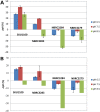Comparative Genomic Analysis of Closely Related Acetobacter pasteurianus Strains Provides Evidence of Horizontal Gene Transfer and Reveals Factors Necessary for Thermotolerance
- PMID: 32015144
- PMCID: PMC7099137
- DOI: 10.1128/JB.00553-19
Comparative Genomic Analysis of Closely Related Acetobacter pasteurianus Strains Provides Evidence of Horizontal Gene Transfer and Reveals Factors Necessary for Thermotolerance
Abstract
Acetobacter pasteurianus is an industrial strain used for the vinegar production. Many A. pasteurianus strains with different phenotypic characteristics have been isolated so far. To understand the genetic background underpinning these phenotypes, a comparative genomic analysis of A. pasteurianus strains was conducted. Based on bioinformatics and experimental results, we report the following. (i) The gene repertoire related to the respiratory chains showed that several horizontal gene transfer events occurred after the divergence of these strains, indicating that the respiratory chain in A. pasteurianus has the diversity to adapt to its environment. (ii) There is a clear difference in thermotolerance even between 12 closely related strains. NBRC 3279, NBRC 3284, and NBRC 3283, in particular, which have only 55 mutations in total, showed differences in thermotolerance. The Na+/H+ antiporter gene nhaK2 was mutated in the thermosensitive NBRC 3279 and NBRC 3284 strains and not in the thermotolerant NBRC 3283 strain. The Na+/H+ antiporter activity of the three strains and expression of nhaK2 gene from NBRC 3283 in the two thermosensitive strains showed that these mutations are critical for thermotolerance. These results suggested that horizontal gene transfer events and several mutations have affected the phenotypes of these closely related strains.IMPORTANCEAcetobacter pasteurianus, an industrial vinegar-producing strain, exhibits diverse phenotypic differences such as respiratory activity related to acetic acid production, acetic acid resistance, or thermotolerance. In this study, we investigated the correlations between genome sequences and phenotypes among closely related A. pasteurianus strains. The gene repertoire related to the respiratory chains showed that the respiratory components of A. pasteurianus has a diversity caused by several horizontal gene transfers and mutations. In three closely related strains with clear differences in their thermotolerances, we found that the insertion or deletion that occurred in the Na+/H+ antiporter gene nhaK2 is directly related to their thermotolerance. Our study suggests that a relatively quick mutation has occurred in the closely related A. pasteurianus due to its genetic instability and that this has largely affected its phenotype.
Keywords: acetic acid bacterium; comparative genomics; horizontal gene transfer; thermotolerant strain.
Copyright © 2020 American Society for Microbiology.
Figures







Similar articles
-
Complete Genome Sequencing and Comparative Genomic Analysis of the Thermotolerant Acetic Acid Bacterium, Acetobacter pasteurianus SKU1108, Provide a New Insight into Thermotolerance.Microbes Environ. 2016 Dec 23;31(4):395-400. doi: 10.1264/jsme2.ME16023. Epub 2016 Sep 24. Microbes Environ. 2016. PMID: 27667143 Free PMC article.
-
Genome-wide phylogenetic analysis of differences in thermotolerance among closely related Acetobacter pasteurianus strains.Microbiology (Reading). 2012 Jan;158(Pt 1):229-239. doi: 10.1099/mic.0.052134-0. Epub 2011 Oct 20. Microbiology (Reading). 2012. PMID: 22016572
-
In vitro thermal adaptation of mesophilic Acetobacter pasteurianus NBRC 3283 generates thermotolerant strains with evolutionary trade-offs.Biosci Biotechnol Biochem. 2020 Apr;84(4):832-841. doi: 10.1080/09168451.2019.1703638. Epub 2019 Dec 18. Biosci Biotechnol Biochem. 2020. PMID: 31851582
-
Genomic analyses of thermotolerant microorganisms used for high-temperature fermentations.Biosci Biotechnol Biochem. 2016;80(4):655-68. doi: 10.1080/09168451.2015.1104235. Epub 2015 Nov 13. Biosci Biotechnol Biochem. 2016. PMID: 26566045 Review.
-
Impacts of bioprocess engineering on product formation by Acetobacter pasteurianus.Appl Microbiol Biotechnol. 2018 Mar;102(6):2535-2541. doi: 10.1007/s00253-018-8819-6. Epub 2018 Feb 11. Appl Microbiol Biotechnol. 2018. PMID: 29430583 Review.
Cited by
-
Comparative Genomic and Secretomic Analysis Provide Insights Into Unique Agar Degradation Function of Marine Bacterium Vibrio fluvialis A8 Through Horizontal Gene Transfer.Front Microbiol. 2020 Aug 11;11:1934. doi: 10.3389/fmicb.2020.01934. eCollection 2020. Front Microbiol. 2020. PMID: 32849481 Free PMC article.
-
Proteolytic Processing, Maturation, and Unique Synteny of the Streptomyces Hemagglutinin SHA.Microbiol Spectr. 2021 Oct 31;9(2):e0076621. doi: 10.1128/Spectrum.00766-21. Epub 2021 Sep 1. Microbiol Spectr. 2021. PMID: 34468183 Free PMC article.
-
Comparison of mucosa-associated microbiota in Crohn's disease patients with and without anti-tumor necrosis factor-α therapy.J Clin Biochem Nutr. 2022 Mar;70(2):182-188. doi: 10.3164/jcbn.21-41. Epub 2021 Sep 25. J Clin Biochem Nutr. 2022. PMID: 35400819 Free PMC article.
-
Draft genome sequence of Acetobacter persici DS1, a strain for high-acidity vinegar fermentation.Microbiol Resour Announc. 2025 Feb 11;14(2):e0111924. doi: 10.1128/mra.01119-24. Epub 2025 Jan 15. Microbiol Resour Announc. 2025. PMID: 39812610 Free PMC article.
-
Transcriptomics of Lactobacillus paracasei: metabolism patterns and cellular responses under high-density culture conditions.Front Bioeng Biotechnol. 2023 Oct 12;11:1274020. doi: 10.3389/fbioe.2023.1274020. eCollection 2023. Front Bioeng Biotechnol. 2023. PMID: 37901845 Free PMC article.
References
-
- Matsushita K, Toyama H, Adachi O. 1994. Respiratory chain and bioenergetics of acetic acid bacteria, p 247–301. In Rose AH, Tempest DW (ed), Advances in microbial physiology, vol 36 Academic Press, London, United Kingdom. - PubMed
-
- Murooka Y. 2016. Acetic acid bacteria in production of vinegars and traditional fermented foods, p 51–72. In Matsushita K, Toyama H, Tonouchi N, Okamoto-Kainuma A (ed), Acetic acid bacteria: ecology and physiology Tokyo. Springer, Tokyo, Japan.
Publication types
MeSH terms
Substances
Supplementary concepts
LinkOut - more resources
Full Text Sources
Molecular Biology Databases

